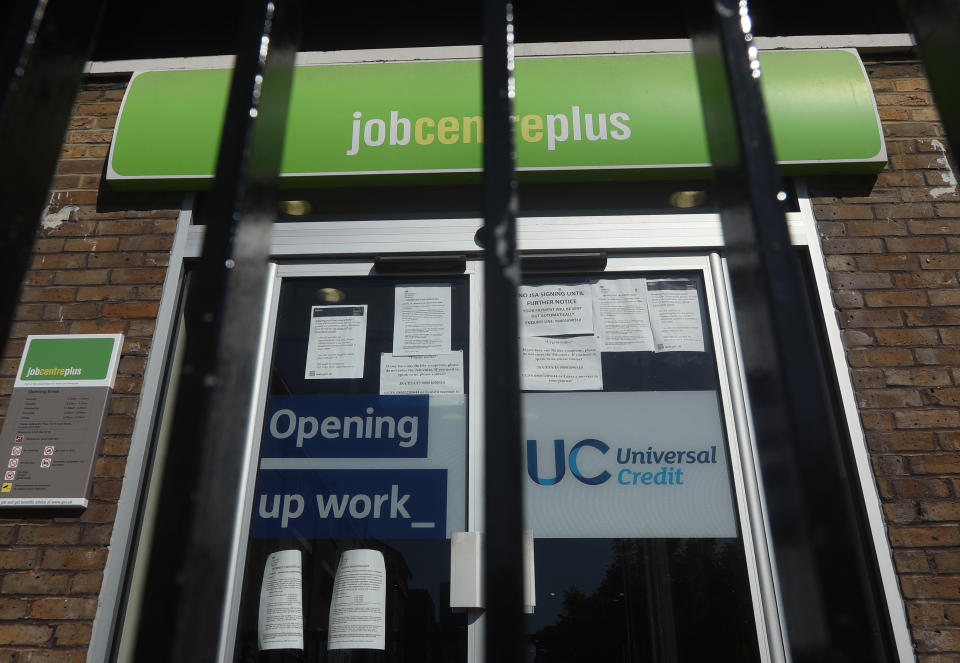Coronavirus: Conservative peer tells UK government to ditch benefit cuts next year

The UK government should ditch plans to slash welfare benefits by £20 a week for millions of households next year, according to a Conservative peer and former government adviser.
Philippa Stroud, a key figure in introducing universal credit in the early 2010s, told Yahoo Finance UK a recent temporary boost to low-income and jobseekers’ benefits should be extended, amid fears of a long-lasting economic fallout of COVID-19.
The government raised universal credit and working tax credit payments after the pandemic hit earlier this year to shield households from the economic crisis.
But the £20-a-week top-up is temporary and lasts only until next April. Ministers have been warned previously it leaves millions of households facing a £1,000-a-year income squeeze next year.
The Resolution Foundation said last month that letting benefits fall would “delay any hope of a post-COVID living standards recovery,” with average household incomes already down 4.5% since the crisis began.
READ MORE: Average incomes take biggest squeeze in half a century
Now Stroud, who worked closely with former work and pensions minister Iain Duncan Smith between 2010 and 2015, has backed calls to maintain current benefit levels beyond next April. “I do think the universal credit top-up should be extended,” she said.
“This would reflect the investment that was intended when universal credit was first designed, and would help to protect those who have been hit hardest by the financial and employment impacts of the pandemic, which are likely to last for some time.”

Around 2.57 million households currently receive universal credit, which is replacing various in-work and out-of-work benefits with a single monthly household payment, and claims soared after lockdown began.
Another 3.72 million households on other benefits are due to be moved onto it by 2024, some seven years later than planned. The rollout has been plagued by IT and other problems, controversy over long waits for payment and political in-fighting.
READ MORE: UK employers have shed almost 650,000 jobs since March
The comments come as the Social Metrics Commission, which Stroud chairs, warns Britain’s poorest workers before the pandemic have been among the hardest hit economically.
Its report on Wednesday said workers already in “deep” poverty before the crisis were 15 percentage points more likely to have lost their job, seen hours cut or been furloughed than those not close to the breadline. Other workers harder-hit than average include people with disabilities, of Black or Asian ethnicities, or aged under 25 or over 55.
The commission, which focuses on measuring poverty, also released a survey which found just one in 10 people in the UK expect the economy to bounce back.
A large majority expect the economy to be weaker for years to come, a view echoed by many economists as hopes of a V-shaped recover fade. Unemployment is widely expected to keep rising this year, with recovery weak, job losses mounting, and the government’s furlough scheme gradually cut back.
Stroud, also CEO of the Legatum Institute think tank, said work remained “one of the most effective pathways out of poverty.”
She said furloughed staff needed support to increase their hours, parents needed to see schools reopen, disabled people needed help finding work and many workers needed better digital skills for the “jobs of the future.”
READ MORE: Average London wages now worth 5% less than in 2007
A government spokesperson said: “We know that this is a particularly difficult time for many on low incomes and have introduced a wide-ranging package of support to help as many people as possible. We’ve injected an extra £9.3bn into the welfare safety net, including increasing universal credit by up to £1,040 a year.
“We have also launched a major effort to tackle loneliness and social isolation during the coronavirus outbreak. This includes a £5m funding boost for national loneliness charities, relaunching the #LetsTalkLoneliness campaign, and publishing new public guidance on how to look after yourself and others safely."

 Yahoo Finance
Yahoo Finance 